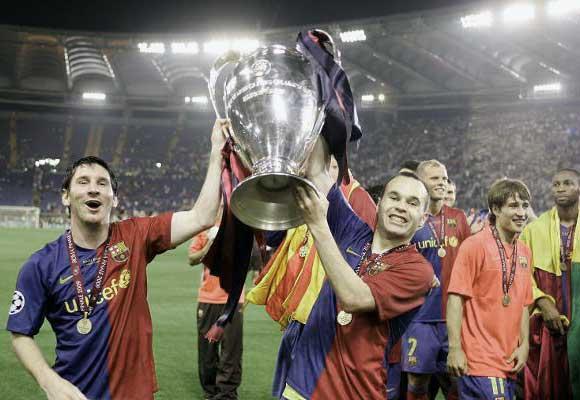Establishment and Formative Period (1899–1922)
Futbol Club Barcelona, commonly known as Barça, was inaugurated on 29 November 1899. The club's founders comprised a collective of Swiss, English, German, and Catalan football aficionados, spearheaded by Joan Gamper. From its inception, FC Barcelona was conceived as an emblem of Catalan identity and regional pride. This is encapsulated in its resonant motto, "Més que un club" (More than a club), which underscores its profound cultural and societal importance within Catalonia. The team's inaugural official match took place in December of 1899, rapidly establishing the club as a central institution of Catalan culture, particularly during a period marked by political and social turbulence in Spain.
Ascension and the Inaugural Golden Age (1922–1957)
The year 1922 marked a significant milestone as FC Barcelona relocated to Les Corts, its first major stadium. This move symbolized the burgeoning popularity of the club within Catalonia and beyond. The decades of the 1920s and 1930s witnessed the team's accumulation of titles, including multiple Campionat de Catalunya and Copa del Rey victories, underscoring their domestic prowess during this era. However, the Spanish Civil War (1936–1939) and the subsequent Franco regime presented formidable challenges to the club and the region. The execution of club president Josep Sunyol by Francoist forces in 1936 transformed Barça into a potent symbol of resistance against political oppression. Despite these adversities, the 1940s and 1950s heralded a period of resurgence, marked by the arrival of iconic players such as László Kubala. Kubala's exceptional talent was instrumental in ushering in a golden age for the club, characterized by the acquisition of five Copa del Rey titles and two La Liga championships.
The Cruyff Revolution and Contemporary Success (1957–1996)
In 1957, FC Barcelona transitioned to its current and iconic home, Camp Nou. The 1970s witnessed the arrival of Johan Cruyff, a Dutch football luminary, whose influence proved transformative both during his tenure as a player and subsequently as a manager. Under Cruyff's strategic guidance in the late 1980s and early 1990s, FC Barcelona achieved a watershed moment by securing its first European Cup (now the UEFA Champions League) in 1992. This triumph was accompanied by a sustained period of domestic dominance, with the club clinching four consecutive La Liga titles from 1991 to 1994. This epoch, frequently referred to as the "Dream Team" era, firmly established FC Barcelona as a preeminent force in global football.
The Messi Era and Unprecedented Hegemony (2003–2021)
The dawn of the 21st century coincided with the emergence of Lionel Messi, widely regarded as one of the most exceptional footballers in the history of the sport. Under the stewardship of managers such as Frank Rijkaard and Pep Guardiola, FC Barcelona entered its most decorated and successful phase. Guardiola's managerial tenure (2008–2012) is particularly noteworthy, as the team amassed an unprecedented 14 trophies in a mere four years. This remarkable haul included multiple UEFA Champions League titles (2009, 2011) and La Liga championships. The team's distinctive playing style, known as tiki-taka, became globally recognized as a paradigm of both aesthetic beauty and tactical efficacy. Messi, in conjunction with other luminaries such as Xavi Hernández, Andrés Iniesta, and Gerard Piqué, constituted the nucleus of a team that exerted unparalleled dominance over the landscape of world football.
Recent Period and Prevailing Challenges (2021–Present)
Following Guardiola's departure, FC Barcelona sustained a trajectory of success under subsequent managers, including Luis Enrique. Enrique notably led the team to a historic treble in 2015, securing the La Liga title, Copa del Rey, and UEFA Champions League. However, the latter part of the 2010s and the early 2020s presented a period of financial exigency and institutional instability for the club. The departure of Lionel Messi in 2021, precipitated by financial constraints, marked the culmination of a significant era. Notwithstanding these extant challenges, FC Barcelona remains steadfastly committed to its foundational philosophy of cultivating talent through its esteemed La Masia academy and maintaining a competitive presence at the highest echelons of football.
Cultural and Social Significance
FC Barcelona transcends the conventional definition of a football club, functioning as a salient symbol of Catalan identity and serving as a global ambassador for the Catalan region and its culture. The club's demonstrated commitment to social responsibility, exemplified through its long-standing partnership with UNICEF and its unique ownership structure (whereby fans, or socis, collectively own the club), distinguishes it from many other prominent football institutions. Barça's enduring motto, "Més que un club," continues to resonate deeply, encapsulating the club's ethos of resilience, communal unity, and the pursuit of excellence.
Accolades and Enduring Legacy
As of 2023, FC Barcelona's trophy cabinet includes an extensive array of domestic and international honors. The club has secured 27 La Liga titles, 31 Copa del Rey trophies, and 5 UEFA Champions League titles, among numerous other accolades. FC Barcelona's enduring legacy is defined not only by its tangible achievements in competitive football but also by its unwavering commitment to an aesthetically pleasing and technically sophisticated style of play, its integral role in the cultural fabric of Catalonia, and its pervasive global influence as one of the most revered and accomplished football clubs in the history of the sport.
Leave a comment
Your email address will not be published. Required fields are marked *

